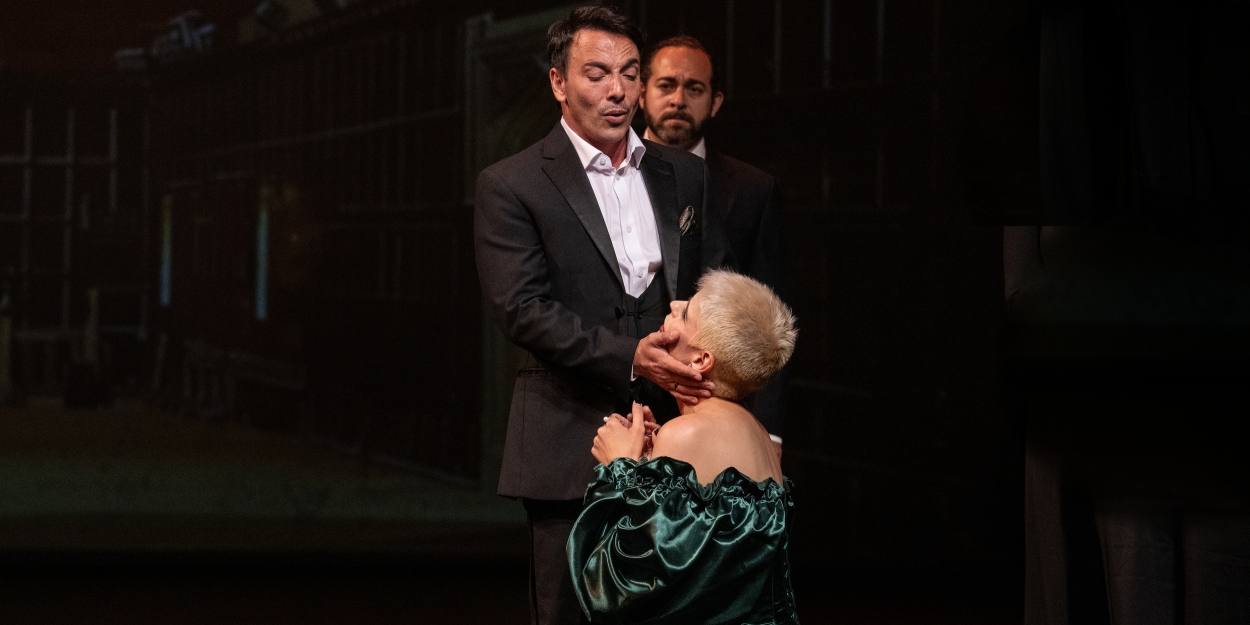Review: Rediscovering Uccelli's ANNA, Teatro Nuovo Again Proves It's Indispensable
Will Crutchfield’s First-Class Company Doubles Bel Canto Opera’s Performance Record with Modern Premiere

An opera doesn’t have to be totally obscure to catch Will Crutchfield’s bel canto eye—but it couldn’t hurt. ANNA DI RESBURGO (ANNE OF ROXBURGH), the first of the two works on this summer’s schedule of the maestro’s company, Teatro Nuovo, certainly falls into that category.
The manuscript of ANNA by Carolina Uccelli with a Gaetano Rossi libretto, was languishing in a Neapolitan archive—with no performance on record since its debut in 1835—when Crutchfield got it in his grasp and readied it for modern consumption. The first, the work's modern premiere, was at Montclair State’s Kasser Theatre on Saturday night, where I was excited and delighted to have heard it with its wonderful cast and orchestra, and in Manhattan, the second on July 24 at the Jazz from Lincoln Center Rose Theatre.
A woman writing operas in the age of Donizetti and Rossini? Unheard of! Yet there she was, with ANNA the second and final of the dramatic works by Uccelli (SAUL, the first, admired by Rossini, is considered MIA), eking out only a pair of performances before vanishing from sight. This opera, which shared a setting (Scotland), a premiere timeline and a leading lady with LUCIA DI LAMMERMOOR (which debuted a month earlier), seemed to have lots of hurdles to clear to find its place in the sun and never made it.
Have you heard of Donizetti’s IL FALEGNAME DI LIVONIA? What about Rossini’s L’EQUIVOCO STRAVAGANTE or Bellini’s BIANCA E FERNANDO/GERMANDO? They were all second full-length operas by bel canto masters in the 19th century. Another sophomore outing, by the more obscure but thoroughly worthy Uccelli, could certainly hold its head high in comparison to other early works by more famous composers than Uccelli.
Could it possibly be any good? It could and it is. For those of us always on the lookout for something outside the standard repertoire (no matter how well performed), it was an eye-opener, a welcome addition to the opera scene at first hearing with a kind of “Law and Order: Scotland” storyline about a murder and a wrongly accused man.
It certainly sounded wonderful with the cast of first-class singers—headed thrillingly by Chelsea Lehnea, Santiago Ballerini, Ricardo Jose Rivera and Lucas Levy—and the marvelous musicians of the Teatro Nuovo Chorus and Orchestra on period instruments that sound very different from their modern equivalents, under Elisa Citterio (first violin and conductor), with Lucy Tucker Yates on cembalo (keyboard). The stage director was Marco Nistico, with chorusmaster Derrick Goff.
Soprano Lehnea was star of the show, both dramatically and vocally, as Anna, with a forceful stage presence and glamorous demeanor, while the disarming tenor of Ballerini—which I’ve admired greatly in other performances--had less to work with dramatically as her husband and wrongly accused murderer, Edemondo. (He seemed to take a while to warm up to his usual stellar self.) They were a good pairing—as they were in POLIUTO last year--in the variously sized ensembles they were part of.
Baritone Rivera did a first-rate job with a role that might be thought of as the “heavy” of the piece (though he ended up saving the day), sounding resonant, vibrant and firm, as did tenor Lucas Levy, as Olfredo, the caregiver for the child of Anna and Edemondo. Soprano Elisse Albian excelled as Olfredo’s daughter, Etelia, being the definition of “there are no small parts, only small performers.”
The company's orchestra was in fine form under Capo d'Orchestra Citterio, with some standout solos in the score for cello (Hilary Metzger), clarinet (Maryse Legault), oboe (David Dickey) and flute (Joseph Monticello), along with Yates on the keyboard.
The opera had a happy ending—a rarity in any era—and deserves a happy ending of its own, with further visibility in the current repertoire.
Caption: Santiago Ballerini, Lucas Levy (rear), Chelsea Lehnea
Credit: Steven Pisano
Reader Reviews
Videos

